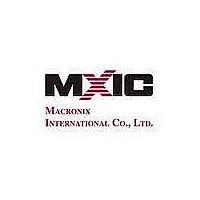mx25l8005 Macronix International Co., mx25l8005 Datasheet - Page 14

mx25l8005
Manufacturer Part Number
mx25l8005
Description
8m-bit [x 1] Cmos Serial Flash
Manufacturer
Macronix International Co.
Datasheet
1.MX25L8005.pdf
(44 pages)
Available stocks
Company
Part Number
Manufacturer
Quantity
Price
Part Number:
MX25L8005
Manufacturer:
MXIC/旺宏
Quantity:
20 000
Part Number:
mx25l8005M2-15G
Manufacturer:
MXIC/旺宏
Quantity:
20 000
Company:
Part Number:
mx25l8005M2C-15G
Manufacturer:
MAXIM
Quantity:
19 882
Part Number:
mx25l8005M2C-15G
Manufacturer:
MXIC/旺宏
Quantity:
20 000
Part Number:
mx25l8005M2I-12G
Manufacturer:
MXIC/旺宏
Quantity:
20 000
Part Number:
mx25l8005MC-15G
Manufacturer:
MX
Quantity:
20 000
Company:
Part Number:
mx25l8005MI-15G
Manufacturer:
MURATA
Quantity:
938
MX25L8005
The self-timed Sector Erase Cycle time (tSE) is initiated as soon as Chip Select (CS#) goes high. The Write in Progress
(WIP) bit still can be check out during the Sector Erase cycle is in progress. The WIP sets 1 during the tSE timing, and
sets 0 when Sector Erase Cycle is completed, and the Write Enable Latch (WEL) bit is reset. If the page is protected by
BP2, BP1, BP0 bits, the Sector Erase (SE) instruction will not be executed on the page.
(9) Block Erase (BE)
The Block Erase (BE) instruction is for erasing the data of the chosen block to be "1". A Write Enable (WREN) instruction
must execute to set the Write Enable Latch (WEL) bit before sending the Block Erase (BE). Any address of the block
(see table 3) is a valid address for Block Erase (BE) instruction. The CS# must go high exactly at the byte boundary (the
latest eighth of address byte been latched-in); otherwise, the instruction will be rejected and not executed.
The sequence of issuing BE instruction is: CS# goes low -> sending BE instruction code-> 3-byte address on SI -> CS#
goes high. (see Figure 20)
The self-timed Block Erase Cycle time (tBE) is initiated as soon as Chip Select (CS#) goes high. The Write in Progress
(WIP) bit still can be check out during the Sector Erase cycle is in progress. The WIP sets 1 during the tBE timing, and
sets 0 when Sector Erase Cycle is completed, and the Write Enable Latch (WEL) bit is reset. If the page is protected by
BP2, BP1, BP0 bits, the Block Erase (BE) instruction will not be executed on the page.
(10) Chip Erase (CE)
The Chip Erase (CE) instruction is for erasing the data of the whole chip to be "1". A Write Enable (WREN) instruction must
execute to set the Write Enable Latch (WEL) bit before sending the Chip Erase (CE). Any address of the sector (see table
3) is a valid address for Chip Erase (CE) instruction. The CS# must go high exactly at the byte boundary( the latest eighth
of address byte been latched-in); otherwise, the instruction will be rejected and not executed.
The sequence of issuing CE instruction is: CS# goes low-> sending CE instruction code-> CS# goes high. (see Figure
20)
The self-timed Chip Erase Cycle time (tCE) is initiated as soon as Chip Select (CS#) goes high. The Write in Progress
(WIP) bit still can be check out during the Chip Erase cycle is in progress. The WIP sets 1 during the tCE timing, and
sets 0 when Chip Erase Cycle is completed, and the Write Enable Latch (WEL) bit is reset. If the chip is protected by BP2,
BP1, BP0 bits, the Chip Erase (CE) instruction will not be executed. It will be only executed when BP2, BP1, BP0 all set
to "0".
(11) Page Program (PP)
The Page Program (PP) instruction is for programming the memory to be "0". A Write Enable (WREN) instruction must
execute to set the Write Enable Latch (WEL) bit before sending the Page Program (PP). If the eight least significant
address bits (A7-A0) are not all 0, all transmitted data which goes beyond the end of the current page are programmed
from the start address if the same page (from the address whose 8 least significant address bits (A7-A0) are all 0). The
CS# must keep during the whole Page Program cycle. The CS# must go high exactly at the byte boundary( the latest
eighth of address byte been latched-in); otherwise, the instruction will be rejected and not executed. If more than 256 bytes
are sent to the device, the data of the last 256-byte is programmed at the request page and previous data will be
disregarded. If less than 256 bytes are sent to the device, the data is programmed at the request address of the page
without effect on other address of the same page.
The sequence of issuing PP instruction is: CS# goes low-> sending PP instruction code-> 3-byte address on SI-> at least
1-byte on data on SI-> CS# goes high. (see Figure 18)
P/N: PM1237
REV. 2.0, APR. 18, 2008
14












